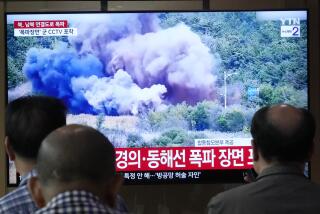North Korea’s Nuclear Program Stirs Fears Here : Foreign relations: The possibility that weapons are being developed on the peninsula produces anxiety among Korean Americans. The worries are fed by memories of war and a concern for loved ones overseas.
Daily reports about efforts by the United States to curb North Korea’s feared nuclear weapons program may be a distant drumbeat for many, but for Angelenos of Korean descent, the news stirs deep anxieties fed by memories of war and concern for loved ones on the Korean peninsula.
A front-page headline in the June 4 edition of the Korea Times on the Korean American community’s reaction to the dispute summed it up: “Koreans Can’t Hide Their Uneasiness.”
“Parents are calling me and asking if it’s OK to send their kids to summer programs in Seoul,” said Tom Byun, the paper’s senior editor. “Travel agents are worried about a decrease in tourism to South Korea. People who have relatives in North or South Korea are worried. They all feel the tension.”
Last week, the United States stepped up its campaign to force North Korea to allow inspections of its nuclear facilities in an effort to determine whether material has been diverted from a power plant for the production of weapons.
Radio reporter Hye Shin Kang of FM Seoul (KFOX 93.5) said many Korean Americans are troubled by the mainstream media’s coverage of the topic, which some in the community have criticized as overheated. “People’s feelings about what’s going to happen waver, depending on what they read or hear,” Kang said. “We try to calm them down.”
The Rev. Hee Min Park, senior pastor of Young Nak Presbyterian Church, said the situation on the Korean peninsula is “the top issue of discussion and prayer” for many of the 7,000 members of his largely Korean congregation.
However, Byun said when he talks to relatives and fellow journalists in South Korea, he gets a different message. “In (South) Korea, it’s pretty calm and normal. I think they are used to it.”
For Koreans, getting used to tension is an unfortunate consequence of having had to live with it for so long.
Surrounded by larger, more powerful countries, Korea has always been caught up in the swirl of international politics. A Korean proverb puts it this way: “Shrimps’ backs are broken in a whale fight.”
In 1910, Japan annexed Korea and ruled it as a colony until Japan’s defeat in World War II. The plan drawn up by U.S. officials in 1945 to accept the surrender of the Japanese army in Korea allowed the Soviet Union to occupy the northern half of the peninsula while the Americans occupied the southern half.
However, that temporary division solidified and led to the development of separate regimes in the north and south. The Korean War of 1950 to 1953 devastated the divided peninsula and left millions separated from their relatives.
“The Korean War is the starting point of the psyche of Korean people today,” said Eui-Young Yu, professor of sociology at Cal State Los Angeles. “Most Korean Americans have someone in their family who was killed, or disappeared or was somehow affected by the war.”
As a result, no one wants to contemplate another war. “I don’t want to hear people talk about what the percentages are for a war,” said Steve SungGill Chang, president of the Korean Federation of Los Angeles. “It’s time for dialogue. We need to explore other diplomatic options. Economic sanctions should be a final step.”
Participants in two recent conferences, one sponsored by the Korea Society/Los Angeles and the RAND Center for Asia-Pacific Policy and the other by the Korean Youth and Student Union and eight other organizations, also promoted negotiation and compromise as the way to ease tensions.
Despite past disappointments, many Korean Americans maintain confidence in the U.S. government’s ability to handle the crisis.
“We get frustrated when we hear about how North Korea is behaving, but there’s nothing we can do about it,” said Jiun Shin, a mental health nurse at the Asian Pacific Counseling and Treatment Center.
The center has had no requests for counseling related to the international dispute, Shin said. But Yu sees the situation as one more crisis beyond the control of weary Koreans in Los Angeles.
“This is a community that is psychologically down” since the 1992 riots, in which 2,000 Korean-owned businesses were damaged, Yu said. “People have lost businesses and homes and are losing their health. . . . If there’s a war, all Koreans will be the losers.”
Yu said his daughter, a graduate student in Seoul, told him not to worry. “She said she keeps in touch with the U.S. embassy and they have evacuation plans all worked out. I hope things don’t get to that point.”
More to Read
Sign up for Essential California
The most important California stories and recommendations in your inbox every morning.
You may occasionally receive promotional content from the Los Angeles Times.










